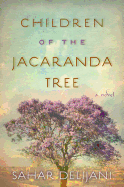
Sahar Delijani tells her own life story in her debut novel, Children of the Jacaranda Tree. The title refers to the offspring of Iran's political activists, men and women imprisoned in Tehran in the early 1980s.
As the novel begins, some children see their parents carted off to prison, some are born in prison and still others are born never having the chance to know their parents. Using alternating points of view, Delijani depicts life within Evin Prison and the lives of those on the outside. Then, she shifts to 2009 and readers are introduced to those same children as adults, allowing an inside view into how their experiences have shaped and defined them.
Delijani's debut is full of rich characters, meticulously developed. Their authenticity draws the reader into their experiences, making it difficult to remain unaffected. The apparent contradiction between the horrors of Iran's revolution and the beauty with which Delijani tells her story becomes clear in the second half of the novel, as the strength and perseverance of the grown-up "children" create an uplifting atmosphere and a sense of hope, of renewal.
Children of the Jacaranda Tree is an enlightening look at--and a reminder of--the individual human element in the larger movements of politics and history. Given its autobiographical roots, Children of the Jacaranda Tree is an especially admirable and brave debut. --Jen Forbus of Jen's Book Thoughts

